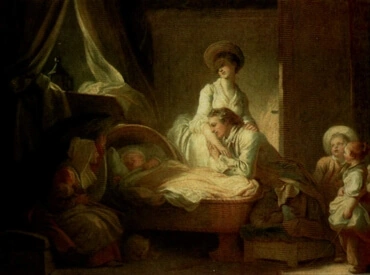In a general sense, being "born" in the Bible represents one spiritual state producing another, usually some form of love or affection producing or "giving birth" to truth or to desires for good. This is not hard to see: If you love someone, that love naturally gives birth to ideas on how to be good to that person and make him or her happy. This is why sons and daughters in the Bible represent true ideas and desires for good. On a higher level, though, being born represents what the Writings call "regeneration," or the life-long process of putting off our natural thoughts and desires and embracing spiritual life from the Lord. This is what the Bible means when it talks about being "born again" – if we live our lives from the Lord, He will eventually take away our evil desires so that we can be "born" as angels in heaven, free of evil desires and dark thoughts. Of course, these two levels of meaning are really one: The Lord is love itself, and if we align with Him we become forms of love and truth ourselves, expressions of His love just as the desire to do something good might be the expression of your love for a friend.
Arcana Coelestia #3599
3599. 'And Isaac his father answered, and said to him' means a perception that natural good would be made Divine. This is clear from the representation of 'Isaac' as the Lord's Divine Rational as regards the Divine Good there, dealt with in 3012, 3194, 3210, from the meaning, in historical descriptions in the Word, of 'laying' as perceiving, often dealt with already, and from the representation of 'Esau', to whom Isaac addressed these words, as Natural good, also dealt with many times above. That it would be made Divine is clear from the blessing which is the subject in what follows. It has been stated above that 'Esau' represents the Lord's Divine Natural as regards Divine Good, and 'Jacob' His Divine Natural as regards Divine Truth; but here 'Esau' represents Natural good that was to be made Divine, and in the verses prior to this 'Jacob' has represented Natural truth which too was to be made Divine. The implications of all this may become clear from what has been stated above in 3494, 3576. Yet to make the matter clearer still let a further brief statement be made about it here.
[2] Natural good, which Esau represents at first, is the Lord's Natural when He was a young child. This was Divine from the Father but human from the mother; and to the extent it was from the mother it was steeped in hereditary evil Its nature being such it was not able instantly to exist within that kind of order in which it could receive the Divine that was present inmostly, but it had first of all to be brought into order by the Lord. It is similar with the truth which Jacob represents; for where good is, so must truth be if it is to be anything at all. The whole area of thought, where truth resides, is joined to the area of will, where good resides. This is so even with young children. Once therefore the Lord had brought into order the Natural as regards Good and as regards Truth within Himself - into the kind of order in which the Natural received the Divine, so that He Himself was flowing in from His own Divine - and once He had gradually driven out everything human received from the mother, 'Esau' at that point represents the Lord's Divine Natural as regards Good, and 'Jacob' His Divine Natural as regards Truth.
[3] But Esau and Jacob represent the Divine Good and the Divine Truth of the Lord's Divine Natural when they have been joined together as brothers. Regarded in themselves Divine Good and Divine Truth are a single power working together to give form to and to receive good and truth that are put into practice. The latter, that is to say, good and truth put into practice, are dealt with later on. These considerations show how many are the arcana contained in the internal sense of the Word. Those arcana are such that not even the most general aspects of them are intelligible to man, as is the case perhaps with those that have just been referred to. How then [can he grasp] the countless specific details regarding them? But they are suited to the grasp and understanding of angels who gain from the Lord heavenly ideas concerning these things and others like them, which ideas are enlightened by representatives full of indescribable pleasantness and bliss. From this one can have an idea of what angelic wisdom is like, yet only a remote idea of it because such things remain in the unenlightened part of man's understanding.







